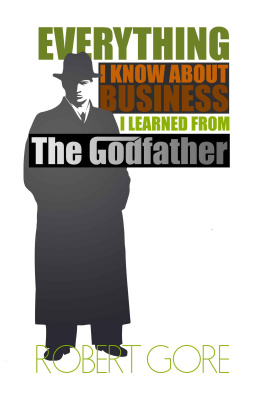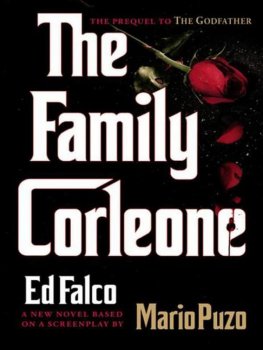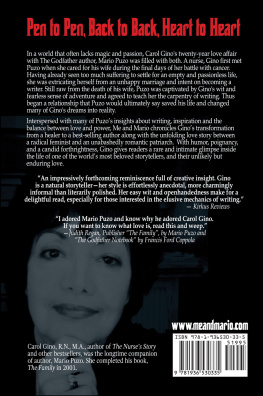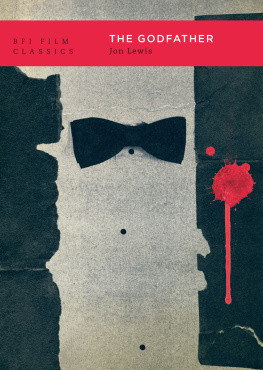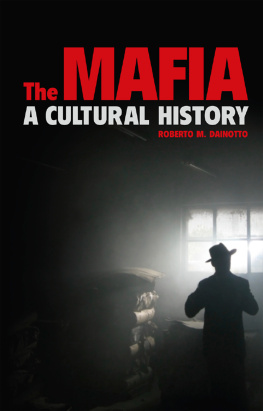EVERYTHING
I KNOW ABOUT
BUSINESS
I LEARNED FROM
THE GODFATHER
EVERYTHING
I KNOW ABOUT
BUSINESS
I LEARNED FROM
THE GODFATHER
ROBERT GORE
Copyright 2019 Robert Gore
All rights reserved
ISBN-13: 978-0-578-56441-8
SLL Press
Dedication
To Enzo the baker, the only true hero in The Godfather
Preface
Writing about The Godfather s business lessons is not an endorsement of horses heads in beds, garroting, cold-blooded murders of business rivals, bribery, extortion, or any other Mafia criminality, any more than writing about the US government is an endorsement of theft via taxation, regulatory extortion, crony socialism, regime changes, senseless and endless wars, intelligence agency skullduggery, Orwellian surveillance, bureaucratic rot, and nonstop lies. Discuss the former and youre a Mafia apologist. Embrace the latter and youre a paid up member of one of the two major political parties. Its all part of the same hypocrisy.
The Godfather, novel and movies, is about a business , the Corleone Mafia family. It offers lessons about business not found in business school texts or the rest of the vast and often useless literature devoted to the subject
The Godfather is not an accurate representation of the Mafia. Real life mafiosi do not have the majesty of Don Vito Corleone, nor the operatic pathos of his youngest sons arc in life. According to a Life magazine fifty-year retrospective on the book and movies, Mario Puzo had
no experience with the Mafia and got most of his material from library research.
Its quite true that a movie like Goodfellas far better captures the unappealing reality of the Mafia. Its also quite true that no Mafia book or movie has come close to capturing the popular imagination like The Godfather.
Lines have become instantly recognized expressions in the common vernacular. Scene s the wedding, Jack Woltzs bedroom, Luca Brasis garroting, Clemenza telling Lampone to take the cannoli, the causeway massacre, the baptism, the contentious meeting between Michael and Senator Geary, Michaels kiss of death for Fredo, Hyman Roth gunned down at the airpor t have become iconic imprints on the collective consciousness. Every Mafia book, movie, and TV series owes an often acknowledged debt to The Godfather. It dwarfs its successors and imitators. There will be no glossy fifty-year retrospectives for Goodfellas.
Complaints about inauthenticity are like complaints that Hamlet is inaccurate history: true, but irrelevant. Both are transcendent works of art, for which reality is a platform, to be used and embellished for the sake of their authors stories and truths. That both endure suggests that those stories and truths have struck deep, responsive chords within the human psyche.
My sources for this book were the novel, The Godfather Part One, Part Two and Part Three movies, and the Life retrospective. Ive read the book maybe ten times and seen the Parts One and Two around fifteen times apiece. Obviously they struck chords in my psyche. I didnt like Part Three as well and mention it infrequently.
Ive said very little about myself or my book in this preface. Im hoping youre not expecting much. The reasons for both will become clear when you read Chapter Five. By the end of the book, you may have picked up a thing or two about business, life, and why The Godfather resonates so deeply.
One final note: this book can be enjoyably and profitably read by those who have never read The Godfather or seen the movies, however, it definitely helps to have some familiarity with the material. If you have none, watching The Godfather Parts One and Two is the quickest way to get up to speed. At worst you will have watched two cinematic classics. Thats not to slight the novel, which is a great book but takes longer to read than the two movies combined six hours.
This book is recommended especially for those who dont like standard business books.
Acknowledgements
I am grateful to my wife, Roberta, who has always supported my writing, and my son, Austin, who has watched The Godfather movies with me many times and has contributed valuable insights.
I am grateful to Holly Ollivander, who had the idea for this book and encouraged me to write it, edited it, designed the cover, and helped with other design elements.
I am also grateful to Mario Puzo, G. P. Putnams Sons Publishing, Francis Ford Coppola, Albert S. Ruddy, Paramount Pictures, Alfran Productions, The Coppola Company, American Zoetrope and Zoetrope Studios, Marlon Brando, Al Pacino, Robert Duvall, James Caan, Diane Keaton, Richard S. Castellano, Abe Vigoda, Talia Shire, Gianni Russo, John Cazale, Robert De Niro, Lee Strasberg, Nino Rota and the rest of the cast and production teams that made The Godfather novel and films enduring classics.
A Note on Terminology
The following Italian terms are used throughout this book (spellings are taken from The Godfather ):
Consigliori : The counselor and right-hand man to the Don, who is the head of the family.
Caporegime : Often shortened to capo; a ranking member of a Mafia family who has made his bones, heads a crew of soldiers, and has major status and influence within the family.
Omerta : The Sicilian code of silence.
Pezzonovantis : Big shots, the people who run things, the powers that be.
The following shorthand is used to denote the novel and the movies:
The Godfather : The Godfather novel, by Mario Puzo, G. P. Putnams Sons, 1969.
Part One : the movie The Godfather, Part One , Paramount Pictures and Alfran Productions, 1972.
Part Two : the movie The Godfather, Part Two , Paramount Pictures, The Coppola Company, and American Zoetrope, 1974.
Part Three: the movie The Godfather, Part Three, Paramount Pictures and Zoetrope Studios, 1990.
If I can prevent one person from attending
business school, my work here is done
Chapter 1
Its Business, Not Personal
T he light flashed on the phone board. It was an internal line. I picked it up.
"Bob, can you meet me in the conference room?" It was Andrew, my boss.
"Sure, I'll be there in a minute."
I was about to be fired.
In 1990, Andrew's father, Don, hired me to run the fixed income department of a Southern California securities firm, a private partnership. I became one of the firm's youngest partners and eventually a member of the executive committee. Don and I had been close friends. He died in 2004 and Andrew took over as the managing partner. We werent close, but we had a cordial working relationship.
For twenty-two years I ran the fixed income department and traded municipal bonds, almost always profitably. In 2005, I saw the housing meltdown coming. We sold my family's home in early 2006, close to the top of the market. I wanted to place a big bet on deteriorating credit quality and a financial crisis. Not on the scale of the heroes of The Big Short , but the same general idea. Andrew gave me permission.
In 2007 I set up an offshoot to the fixed income department, a proprietary trading desk that would speculate not just in bonds, but futures, commodities, currencies, and swaps. I was particularly interested in credit default swaps, esoteric financial instruments that were essentially bets on the credit quality of a corporation or government.
I hired an experienced credit default swaps trader and another trader. Like a big hedge fund, we set up a prime brokerage account with one of the Wall Street firms. I quit trading municipal bonds to oversee the operation.
It worked. In 2008, a year in which virtually every bank and Wall Street firm lost money and many of them either went out of business or would have except for government bailouts, our little proprietary trading desk made a bundle on the financial meltdown. Much of the profits came from owning credit default swapsbearish credit-quality betson those banks and Wall Street firms.
Next page
